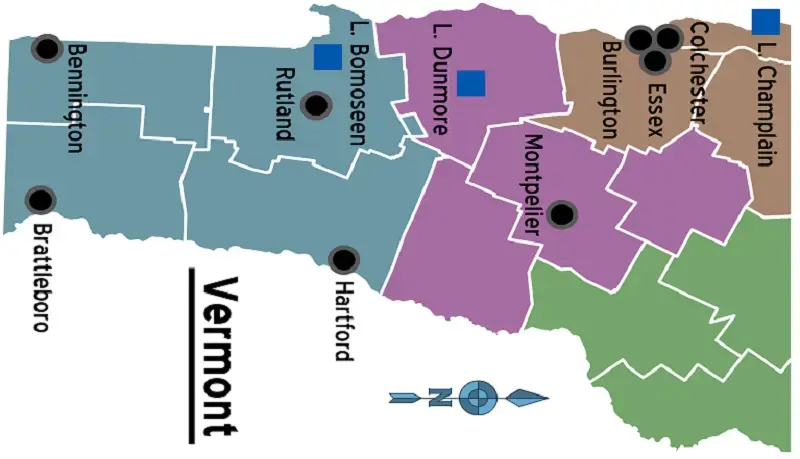Reentering society after incarceration comes with numerous challenges, and one of the most significant hurdles for individuals with a criminal record is finding stable housing. Finding suitable housing can be a challenge for individuals with a felony conviction on their record. In Vermont, where the importance of reintegration and second chances is recognized, resources and programs are available to help felons secure housing and rebuild their lives. This blog post aims to provide valuable information and guidance on the options and steps for apartments for Felons in Vermont. Whether you are a felon looking for a fresh start or someone seeking to support and advocate for the reintegration of offenders into society, this article will serve as a comprehensive guide to navigating the housing landscape in Vermont.
Housing For Felons In Vermont

Finding a home is tough, but for felons in Vermont, it’s like trying to solve a Rubik’s cube blindfolded. Once they’ve paid their debt to society, they face a maze of restrictions and challenges when finding a place to call home. In this article, we’ll explore the housing hurdles that ex-cons in Vermont encounter, and how these obstacles affect their chances of successful reintegration into society.
It’s no secret that society is cautious when it comes to renting or selling homes to felons. Vermont has its fair share of policies and restrictions in place, making it even more arduous for offenders to find housing. From blanket bans on renting to individuals with criminal records to landlords conducting extensive background checks, the barriers are high. Criminal records can be like a scarlet letter, deterring landlords from considering applicants with a tainted past. We’ll delve into these housing restrictions and how they affect felons seeking a place to live.
Impact Of Housing Restrictions On Recidivism Rates
Housing restrictions can significantly impact recidivism rates for individuals with criminal records. When individuals are released from incarceration but face challenges in finding stable housing due to restrictions, it can increase the likelihood of them returning to criminal activities.
-
Limited Housing Options
Restrictions may limit the available housing options for individuals with criminal records, making it difficult for them to secure safe and stable housing.
-
Increased Vulnerability
Without stable housing, individuals may be more vulnerable to factors such as homelessness, unemployment, and substance abuse, which are linked to higher recidivism rates.
-
Stress and Mental Health
Difficulty in finding housing can contribute to stress and negatively impact mental health, potentially leading to a higher likelihood of reoffending.
-
Reintegration Challenges
Housing restrictions can hinder the reintegration process, making it harder for individuals to rebuild their lives and establish positive connections within the community.
-
Cycle of Recidivism
The inability to secure housing may contribute to a cycle of criminal behavior, as individuals may resort to illegal activities to meet their basic needs.
Efforts to reduce housing restrictions, provide supportive reentry programs, and promote the integration of individuals with criminal records into communities can play a crucial role in breaking this cycle and reducing recidivism rates. Addressing the root causes of criminal behavior, including housing instability, is essential for effective rehabilitation and community reintegration.
Housing programs specifically designed for felons
Several housing programs and resources are designed to assist individuals with criminal records, including felons, in finding stable housing. While availability varies by location, here are some common types of programs:
-
Second Chance Programs
Some non-profit organizations and government agencies run Second Chance programs that specifically aim to help individuals with criminal records secure housing and reintegrate into society.
-
Transitional Housing Programs
These programs provide temporary housing and support services to individuals recently released from incarceration, helping them transition to independent living.
-
Reentry Programs
Many reentry programs offer comprehensive assistance, including housing support, job training, and counseling, to help individuals with criminal records reintegrate into the community successfully.
-
Housing Authorities
Some local housing authorities offer assistance to individuals with criminal records, and they may have specific policies or programs aimed at facilitating housing for this population.
-
Non-Profit Organizations
Various non-profit organizations focus on reentry and housing for individuals with criminal records. Examples include the Fortune Society, which operates in New York, and the Safer Foundation, which operates in Chicago.
-
Supportive Housing Programs
These programs combine housing with support services such as counseling, job training, and substance abuse treatment, providing a holistic approach to reintegration.
-
Section 8 Housing Choice Vouchers
In some cases, individuals with criminal records may qualify for Section 8 vouchers, but policies vary by jurisdiction, and certain convictions may impact eligibility.
It’s crucial to research and reach out to local organizations and government agencies that specialize in reentry services to get specific information tailored to your location and circumstances.
Collaboration Between Government Agencies And Community Organizations To Address Housing Needs
Collaboration between government agencies and community organizations is essential to effectively address housing needs, especially for vulnerable populations, including individuals with criminal records. Here are ways such collaboration can be beneficial:
-
Holistic Support
Government agencies and community organizations can work together to provide holistic support, combining housing assistance with services such as job training, mental health counseling, and substance abuse treatment to address the multifaceted needs of individuals.
-
Information Sharing
Collaboration allows for the exchange of information between government agencies and community organizations, enabling a more comprehensive understanding of the challenges faced by individuals seeking housing and promoting a coordinated response.
-
Policy Advocacy
Community organizations can advocate for policy changes at the local, state, or federal levels, encouraging more inclusive housing policies that take into account the rehabilitation and reintegration of individuals with criminal records.
-
Resource Pooling
By pooling resources, both financial and human, government agencies and community organizations can maximize their impact. This may include leveraging government funding with the expertise and community connections of non-profit organizations.
-
Training and Education
Collaborative efforts can involve training for government agency staff on the unique needs and challenges faced by individuals with criminal records. This can improve the sensitivity and effectiveness of government programs.
-
Preventing Homelessness
Early intervention and collaboration can help prevent homelessness by identifying individuals at risk and providing the necessary support before they face housing crises.
-
Community Engagement
Involving the community in the design and implementation of housing programs ensures that solutions are culturally sensitive and responsive to the specific needs of the local population.
-
Measuring Impact
Collaboration allows for better tracking and measurement of program effectiveness. Both government agencies and community organizations can work together to assess outcomes and make data-driven improvements.
Role Of Community Organizations In Supporting Reentry Housing
Community organizations play a crucial role in supporting reentry housing for felons. These organizations understand the unique challenges that felons face and work tirelessly to bridge the gap between housing barriers and successful reintegration. Whether it’s providing transitional housing, rental assistance, or connecting felons with landlords who are willing to give them a second chance, these organizations are instrumental in creating a supportive environment for felons looking to rebuild their lives.
Other interesting posts:
- Second Chance Housing In Massachusetts
- HUD Homes For Those With Bad Credit
- Suitable Shelter For Felons In Maine
- Apartments For Felons In Connecticut
- Affordable Apartments For Felons In Montana
Tips For Finding Apartments In Vermont
-
Online Platforms
Utilize websites and apps like Craigslist, Zillow, or Apartments.com to browse available apartments in Vermont.
-
Local Newspapers
Check classified ads in local newspapers, as some landlords still use this traditional method for advertising rentals.
-
Real Estate Agents
Contact local real estate agents who may have information on available rental properties.
-
Community Bulletin Boards
Explore community bulletin boards in grocery stores, community centers, or coffee shops for rental postings.
-
Networking
Connect with locals or join community groups on social media to get insights and recommendations for available apartments.
-
Property Management Companies
Consider reaching out to property management companies in Vermont, as they often manage multiple rental properties.
-
Visit Neighborhoods
Walk or drive through neighborhoods you’re interested in; some landlords may post “For Rent” signs instead of advertising online.
-
Affordable Housing Programs
Check if you qualify for affordable housing programs offered by local housing authorities or non-profit organizations.
-
Local Housing Authorities
Contact local housing authorities for information on subsidized housing options and waiting lists.
-
Be Prepared
Have your rental history, references, and proof of income ready to present to potential landlords. This can make you a more attractive tenant.
Safe And Affordable Places To Live In Vermont

Vermont is generally known for its safety and scenic communities. Here are a few places that are often considered safe and relatively affordable:
-
Burlington
Vermont’s largest city, offering a blend of urban amenities and natural beauty. It has various neighborhoods with different affordability levels.
-
South Burlington
Adjacent to Burlington, it’s a suburban area with good schools and community amenities.
-
Montpelier
The state capital is known for its small-town charm and safety.
-
Essex Junction
A suburb of Burlington, offering a mix of residential and commercial areas.
-
Brattleboro
Located in the southeastern part of the state, it’s known for its artsy vibe and community spirit.
-
Rutland
Vermont’s third-largest city, with a lower cost of living compared to Burlington.
-
Bennington
In the southwestern part of the state, it’s known for its historic charm and affordable living.
Conclusion
We hope you found our blog post on apartments for felons in Vermont informative and helpful. Finding suitable housing can be a challenge for individuals with a criminal record, but it is not impossible. We have provided valuable information and resources to assist offenders in their search for housing in Vermont. Remember to be persistent, proactive, and transparent in communicating with potential landlords or housing organizations. With the right strategies and support, felons can secure safe and stable housing to rebuild their lives. If you have any further questions or need additional assistance, please do not hesitate to reach out to us. Good luck in your housing journey!